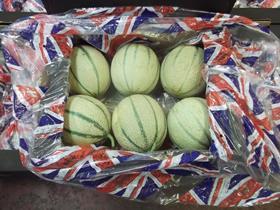
British-grown melons hit the headlines in August when top-fruit producer Newmafruit announced it had struck a deal to supply over 5,000 Magritte melons to Morrisons and The Co-operative.
Up until 2009, when Stephen McGuffie of New Farm Produce grew the UK’s first commercial crop of melons in Staffordshire to make use of his strawberry tunnels out of season, the fruit had been exclusively imported. He won Marks & Spencer Grower of the Year Award for Innovation in 2011 for growing British watermelons and that same year harvested his largest crop of around 30 tonnes of melons.
This season he is preparing to start harvesting his crop to supply Sainsbury’s and M&S from mid-September, which will be branded as a premium product with British labels.
So with more growers venturing into the world of this once exotic fruit, what is the potential for UK melons? “It really is a genuine opportunity, not a novelty,” says Judy Whittaker, communications manager for Fresca. “It is an opportunity presented by changing climate and growers diversifying to try to get more crop from their tunnel acreage.”
However, she warns it is not a simple crop to grow in the UK and a lot of development work is still ongoing. “We need to work out which varieties perform the best. Some varieties that grow well in Spain might be susceptible to mildew here,” she explains.
McGuffie has grown watermelons, Charantais, Galia, Cantaloupes and has also trialled Honeydew and Piel de Sapo, working closely with French growers to share techniques for polytunnel growing. “He has learnt a lot in the five years he has been doing this; lots about how the melons grow, about what techniques work. He is going in the right direction and improving year on year,” says Nick Hall, account manager for Mack Multiples, which work closely with McGuffie. Some in the melon sector remain sceptical, however. “I think they will be too expensive [compared to imported melons] because they can’t be grown outdoors,” says Frank Levarht of Dutch produce trader Levarht. “I don’t think it is viable.”
The marketing manager of another major melon importer agrees. “They won’t gain significant market share. They might be a niche product but I think they will be too expensive and I can’t see how they’ll be profitable.”
Hall acknowledges UK melons are not currently a profitable enterprise, mainly due to higher production costs associated with growing in tunnels rather than the open field. “There are two challenges in the UK – one is around cost – UK melons are grown on a much smaller scale than Spain, and also are grown in polytunnels, compared to the Spanish open crop season. This makes production less efficient and thus more costly. The second challenge is climatic – melons are typically grown in much hotter climates. Because of the economies of scale not being there, costs are much higher in comparison to other more established crops. As areas of production increase, there will be greater economies of scale and thus will be more financially sustainable.Having said that, the retailers understand this and the melons are sold for a premium.”
And Whittaker says there is still a lot of development work to enable the whole chain to work well. “You can’t just roll this out to a soft-fruit grower as a new crop for his tunnel, there is strategic development work behind it, and you have got to grow your retailer demand as well. Commercially it has got to find its place in the market and you have got to get the cost of production worked out so it is a profitable crop for growers.”
However, there is optimism from Newmafruit that there is potential for UK-grown melons to bring a new income stream for the nation’s soft-fruit growers.
“If this is successful we will significantly expand the operation next season as we have over 20 polytunnels with the capacity for 400 plants per tunnel,” managing director Tony Frankham said when announcing the news of his crop.
“I think us succeeding would be a good thing for the fresh produce industry as it could help to introduce a new mainstay home-grown crop and reduce the need for imports on melons, which are obviously
very high.”—
MELONS IN GROWTH
Sales of melons are up, thanks to the hot summer encouraging consumers to purchase more of the fruit.
According to Kantar data, value sales rose 7.2 per cent to £13.4 million in the 52 weeks to 18 August, while volumes increased 7.4 per cent to 13.8m tonnes.
Watermelons had a strong year, with volumes up 24.2 per cent, while baby watermelons – around a quarter of the size of the conventional variety – saw a 9.2 per cent boost in volumes. Frank Levarht says baby watermelons are gaining in popularity across Europe as consumers seek out a more convenient and less wasteful way to enjoy the taste of watermelons.
Honeydew remained the biggest selling variety with sales increasing nine per cent by value and 5.1 per cent in volume.
Prepared melon is a growing market, as it is still highly seasonal, with potential for further growth. Tesco buys prepared watermelon chunks in the summer but not in the winter, for example. Transit times are much longer outside the Spanish season. “This means it is softer, and the structure is not as good in the winter season,” says Levarht. “There is a big potential,” he adds, if the quality can be improved.
Meanwhile Morrisons has just opened a new £1m melon processing room at its plant in Thrapston, Northamptonshire, which has the capacity to produce 100,000 portions a day. —



